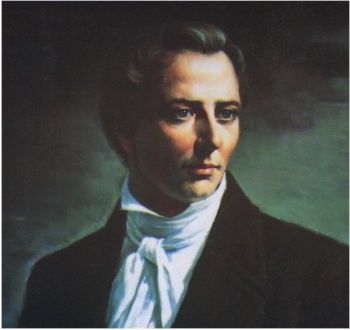The greatness of Joseph Smith was his greatness as a follower of the Lord Jesus Christ. Joseph Smith, following in the footsteps of his Savior, Jesus Christ, learned the meaning of persecution. Joseph experienced the blind, irrational behavior of some ignorant human beings. He knew what it was to be hurt again and again by unkind remarks. He knew the feeling of being laughed at, ridiculed, and insulted. He knew the discomfort of physical abuse and the unfairness of corrupt public officials. It seems apparent that these continual adverse experiences increased the Prophet’s awareness of the feelings and needs of his fellow human beings. He appreciated deeply any display of kindness or any word of encouragement. While in the Liberty Jail, he thanked Mrs. Norman Bull for visiting him and said of his imprisonment: “It seems to me that my heart will always be more tender after this experience than ever before.” 15 On another occasion he said, “God does not look on sin with allowance, but when men have sinned, there must be allowance made for them.” 16 To the members of the Relief Society he cautioned:
I have one request to make of the President and members of the society, that you search yourselves—the tongue is an unruly member—hold your tongues about things of no moment…Put a double watch over the tongue…The object is to make those not so good reform and return to the path of virtue that they may be numbered with the good…17
 Joseph Smith was given great responsibility in life, responsibility that brought him in contact with mean and vile people—people who often showed no mercy. This treatment did not deaden the Prophet’s sensitivity to good and right, but increased it.
Joseph Smith was given great responsibility in life, responsibility that brought him in contact with mean and vile people—people who often showed no mercy. This treatment did not deaden the Prophet’s sensitivity to good and right, but increased it.
The power of God was in Joseph Smith, the surging power that can come only to a man who has faith in the Lord Jesus Christ and has proven his devotion in the fires of adversity. George Q. Cannon said of Joseph Smith:
Think of what he passed through! Think of his afflictions, and think of his dauntless character! Did any one ever see any lack in him of the power necessary to enable him to stand with dignity in the midst of his enemies, or lacking in dignity in the performance of his duties as a servant of the living God? God gave him peculiar power in this respect. He was filled with integrity to God; with such integrity as was not known among men. He was like an angel of God among them. Notwithstanding all that he had to endure, and the peculiar circumstances in which he was so often placed, the great responsibility that weighed constantly upon him, he never faltered; the feeling of fear or trembling never crossed him—at least he never exhibited it in his feelings or actions. God sustained him to the very last, and was with him and bore him off triumphant even in his death. 18
Joseph never let the Lord down and faltered rarely and only momentarily. Joseph bore witness of God under the most trying and dangerous circumstances and did the work of the Lord when it literally cost him tears, sweat, and blood. Joseph Smith would translate when his body cried out for food; the voice of his great spirit cried out stronger for knowledge and truth. His dedication, proven in several states, was not to go unrewarded. When Joseph Smith stepped into the presence of a man, that man knew that here was a representative of God. When Joseph Smith stood before a congregation, his muscular body pulsed with the spirit of God and his eyes penetrated the very souls of those who sat before him—friends and enemies.
All such in his persona and spirit created conversation about the greatness of Joseph Smith. What greatness? The greatness of a prophet, an intellectual, a leader of men, a husband and father, a son, a humanitarian—yes, all of these. But his true greatness lies in his relationship with his God. Joseph Smith, the representative of Jesus Christ, whose reaction from the first time he knelt in the grove of trees as a boy not yet fourteen years of age until he died a martyr by a mobster’s bullet when he was not yet thirty-nine years of age, was “Thy will and not mine be done.”
He did not enjoy persecution. He did not enjoy bearing burdens alone. He did not enjoy suffering, his own suffering or the suffering of loved ones. He did not enjoy privation, hunger, or hardship. He did not want to die. He had a relish for life. He cherished it perhaps as few men have. He did not want to leave his farm, his city, his wife, his unborn child. But Joseph’s response to all of this was “not my will, but thy will be done.”
Article adapted by Leon Hartshorn, Unformatted Source info: JOSEPH SMITH: PROPHET OF THE RESTORATION, by Leon R. Hartshorn. Deseret Book 1970.
Footnotes:
15. Ibid., 6:286.
16. Ibid., 5:241.
17. Ibid., p. 20.
18. JD 23:362.
Additional Resources:
Joseph Smith: Prophet of the Restoration
The Book of Mormon: Another Testament of Jesus Christ
The Lord Jesus Christ in Mormonism
Additional Articles in This Series:
Joseph Smith: A Man of Courage
Joseph Smith: A Prophet of God
A Voice of Gladness: Happiness through an Eternal Perspective
